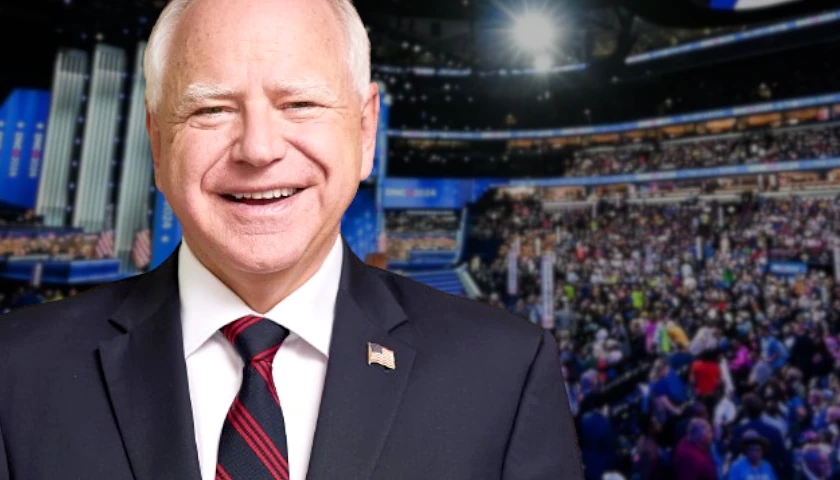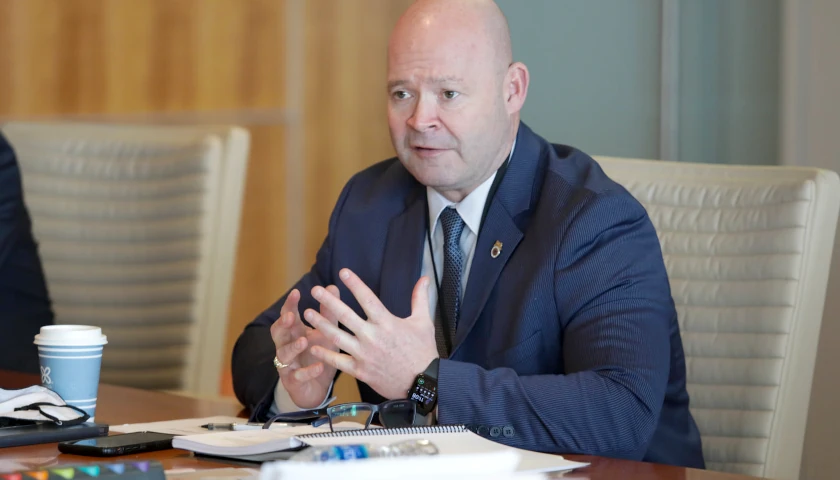by Edward Ring
Until a few years ago, corporate political influence in the United States was balanced between those promoting a progressive, green agenda, and those maintaining a distance from social equity issues while continuing to lobby for conventional energy policies. But the incredible wealth amassed by high-tech companies over the past few years—all of them progressive and “green”—has completely overwhelmed that balance. America’s corporate establishment has now joined with the financial, academic, and media establishments, along with government bureaucracies, to unequivocally support progressive politics.
Writing for the trade publication Natural Gas Now, Heartland Institute scholar and author Ronald Stein had this to sayabout the emerging “Environmental, Social, and Governance” ethos that is sweeping through the business and government elites in the Western world:
Allowing banks and investment giants such as BlackRock, led by CEO Larry Fink to collude to reshape economies and energy infrastructure is a very dangerous precedent. Their movement promotes the idea of a forcibly monolithic, regimented nation under the control of the investment community. It is scarily beginning to resemble the fascism that dominated the media in the past. The American people never voted to give banks this sort of control over our country.
According to the St. Louis Federal Reserve, 32 percent of the wealth in the United States in 2021 was held by one percent of the population, while the bottom 50 percent of U.S. residents only held just two percent of all U.S. wealth. This sort of distribution of wealth is not unique in American history. But what is unique today is the simultaneous drive on the part of the super-rich to make basic necessities unaffordable to ordinary Americans.
This isn’t news. The destruction of the middle class, the transfer of middle-class wealth upwards to the one percent, the creation of a permanent underclass dependent on government—all of this is well understood by the remaining opposition, variously described as populists, national conservatives, or MAGA conservatives. With the rise of the tech sector to become the most powerful force in what was already a progressive juggernaut, the opposition needs reinforcements.
With this in mind, the relationship between conservatives and organized labor requires serious reassessment, because labor unions are potential allies powerful enough to tilt the balance of political power in the United States back to policies that support the interests of the American people broadly.
Without the power of organized labor, it may be impossible to counteract the influence of multinational corporations that have almost universally adopted an agenda designed to create scarcity of every resource fundamental to the existence of a thriving middle class: energy, water, transportation, and housing.
Organized Labor Doesn’t Have to be the Enemy
The labor movement in America is fragmented, inexplicably united only around one thing: support for a corporate globalist agenda. This is primarily expressed in their indifference to immigration policies that undermine the labor market, and environmentalist-inspired policies that make everything unaffordable. But if labor unions were to re-embrace their foundational principles, they would see these policies for what they are: The priorities of an oligarchy on the verge of acquiring absolute political and financial power.
Meanwhile, Americans who have already awakened to the ongoing destruction of economic opportunities and political freedom by elected leaders allegedly looking out for their interests may find new alliances within the American labor movement. While it isn’t uncommon for anyone critical of organized labor to accuse unions of being socialist, such criticism ignores an essential truth: All government, indeed society itself, consists of versions of collective behavior.
The many ways that individuals share the burden of coping with risk, chaos, and oppression might all be considered forms of collectivist redistribution. When people purchase insurance, they are distributing the burden of an accident that may befall them onto a pool of similarly concerned individuals. When people submit to government authority, they do so because the social contract they’re accepting, and the taxes they pay, enable them to live with increased safety and shared rules.
In this context, unions are just another form of organized behavior, accepted by individuals because it gives them a chance to live better lives. One may debate important details—whether anyone should be forced to join a union as a condition of getting a job, to offer one rather significant example—but the fundamental concept of collective bargaining is not some novel aberration, sprung from the bowels of Marxism. Unions can be a normal feature in a healthy democracy and can embrace an agenda that supports even some of the most critical elements of conservative values.
The Problematic Aspects of Union Power
Whether or not a union is a necessity, or an unchecked and parasitical menace can often come down to whether the union represents private-sector workers or public-sector workers. The hypothetical examples below of Sarah (a private-sector worker) and George (a public-sector worker) should help to illustrate this point.
Sarah has worked for a major grocery store chain for the past 25 years. Adjusting for inflation, she makes less now than she did over a decade ago, especially since her hours were cut in order for her employer to avoid being required to offer her health insurance. Making matters even more difficult, she is “on-call” most of the week, without a reliable schedule, which makes it impossible for her to take on a second part-time job to help make ends meet. Including benefits, Sarah is lucky to make $30,000 per year. Now in her early 50s, she will need to work for as long as there is strength left in her body to do the job.
George works for a fire department serving an affluent suburb on the California coast. Taking into account the vacation time he earns as a 25-year veteran, he works less than two 24-hour shifts per week before qualifying for overtime. Since five-day weekends are overkill, he often works one or two extra shifts a week, doubling his pay. When he goes on calls, 98 percent of the time they are medical emergencies, not fires. Including moderate amounts of overtime and the employer’s payments for his benefits, George makes about $250,000 per year. Now in his early 50s, he will retire in a year or two and collect a pension and health benefits package worth well over $100,000 per year.
Both of these individuals are hardworking, honest, and conscientious. Both of them perform jobs that play a vital role in our society. Both of them deserve to be treated with dignity and respect. Neither of them wrote the rules. And both of them are represented by unions.
While these individuals and the work they do is beyond reproach, the unions that represent them leave much to be desired. In Sarah’s case, typical of tens of millions of private-sector workers, the unions that represent her have ignored economic reality in pursuit of ideological fantasies. Almost universally, to cite a particularly wounding example, these private-sector unions have supported immigration policies that increase the supply of semi-skilled workers who compete with Sarah for work hours.
Also common are the pragmatic alliances these unions form with extreme environmentalist organizations that have bottled up development of land and energy, driving the cost of living beyond the reach of an ordinary worker. One may ponder endlessly over what constitutes optimal and humane policies with respect to immigration and the environment. But to agitate for higher wages and benefits in a society awash in cheap labor and artificially inflated costs for basic necessities is a fool’s errand.
In George’s case, which is equally typical, at least in California, the unions that represent him should not even be permitted to exist. Associations of government workers engaged in collective bargaining are not unions in any traditional sense of the word. They elect their own bosses, they take money from taxpayers instead of competing for consumer spending, and they operate the machinery of government which lets them intimidate or co-opt any special interest that might oppose them. They have priced normal government services beyond the capacity of ordinary taxpayers, and bred cynicism about government into the heart of any financially literate American.
And government unions have even less interest than private unions in acknowledging the complexity of issues such as immigration or environmentalist overreach. In both cases, policies that harm the aspirations of private workers have the opposite effect on them, enhancing their job security.
The reality today is that much of America’s labor movement has gone astray. Private-sector unions often put ideological goals ahead of the economic interests of their members. And public-sector unions, which are not unions in any traditional sense of the word, and which represent the economic interests of their members all too well, are an abomination. They have corrupted our democracy; they are a corrupting influence on government workers, because they have exempted them from the economic challenges facing private American workers; they are driving our governments at all levels towards authoritarianism; they are bankrupting our cities and counties and states; and the pension funds they control are some of the most corrupt elements of America’s grotesquely overbuilt financial sector.
Which Unions Are Candidates for Realignment?
There are daunting challenges confronting those on the Right who want to form alliances with unions. America’s public sector unions pursue an agenda inherently in conflict with the interests of taxpaying, private-sector households. But millions of government employees still embrace the ideals of public service and patriotism. This has been seen in the recent activism by police unions to push back against rogue district attorneys who have sown chaos into America’s cities, as well as by border patrol agents calling for more support to end human trafficking and drug smuggling.
The excessive politicization of government programs, from law enforcement to homeless policy to public education, may eventually trigger a conservative insurrection even among public-sector union membership. The Right should not dismiss this opportunity as unrealistic. Grabbing just a percentage of public-sector union support for right-leaning policies could tilt the balance of power.
As for private-sector unions, in most cases their policies are already doing more harm than good to the average worker. Ask the pipefitters, the ironworkers, the heavy equipment operators, or any of a variety of workers who engage in building and maintaining America’s infrastructure who they voted for, and why. Then ask them who their unions endorsed. Private sector union leadership is out of touch with its membership in these sectors, and there’s no reason an insurgency from within could not realign their political priorities in favor of the Right.
Reimagining how the labor movement might best operate in the interests of the American worker is difficult but necessary. It requires balancing libertarian and mixed-capitalist economic worldviews. Ultimately, labor union leaders, along with conservatives of all varieties, might ask themselves one question: Has America become a progressive oligarchy, and if so, what are we going to do about it? Against this extraordinary threat to freedom, prosperity, and national sovereignty, unions and conservatives can work together, and compartmentalize their ongoing conflicts over right-to-work and card check.
Unions, if they returned to their roots, could help bring manufacturing back to America. They could bring back a viable energy economy. They could stand up to environmentalists who want to pack as many Americans as possible into subsidized urban high-density housing. And perhaps most importantly, they could support applying antitrust statutes to the business and financial monopolies that have corrupted and discredited capitalist principles. They could do these things in partnership with conservatives, creating a coalition powerful enough to defeat the progressive juggernaut and win state and national elections. In doing so, they would rescue America’s middle class from oblivion.
– – –
Edward Ring is a senior fellow of the Center for American Greatness and co-founder in 2013 of the California Policy Center.






[…] by Edward Ring | Tennessee Star […]
Teaming up with unions is akin to a person swallowing poison to kill a parasite. It might kill a parasite, but the person will never know it because they are already dead. Public sector unions should have been outlawed years ago.
Totally agree. We would have a better shot if public sector unions were forcefully dismantled and restructed in the taxpayers interest. A monumental great at best…